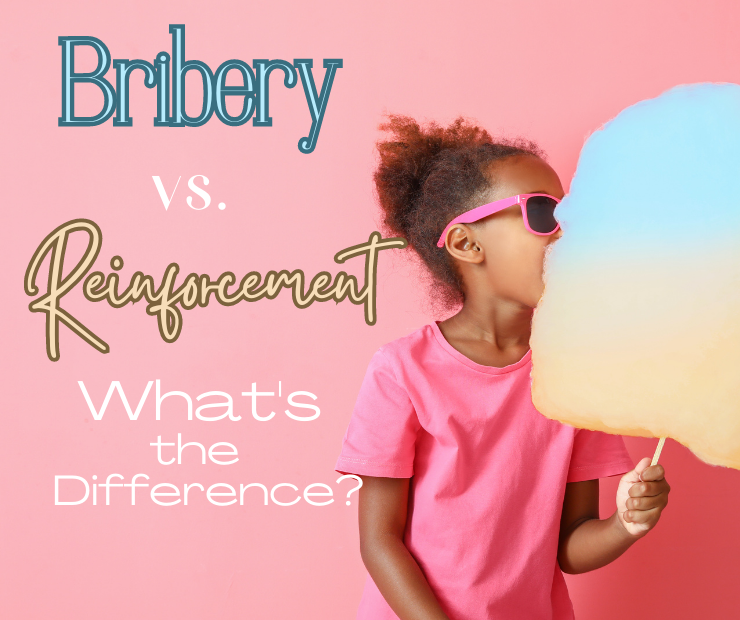Dealing with the terrible two stage most parents will do anything to get through the day without a big meltdown or five. So you find yourself offering toys and candy just to get some peace and quiet.
I find a lot of parents will act like it is a bad thing to reward their children throughout the day or they will mention they had to bribe them to get them to behave. There is absolutely nothing wrong with reinforcing your child when they behave as expected or when they stay with you through the grocery store and want a piece of candy at the end. THIS IS NOT BRIBERY AND IT IS NOT BAD! Reinforcement is good Bribery is not the best (but sometimes necessary).
Rewarding your kiddos when they engage in behaviors you want to see more of is one of the best things you can do to continue seeing those behaviors. They do not always have to be material rewards or sweet rewards, of course, but especially for young kiddos that typically goes further than hugs, praise and kisses.
So when is it bribery and when is it reinforcement?
Defining Bribery and Reinforcement
Bribery is often defined as offering a reward to stop an unwanted behavior while it is occurring, usually in a desperate attempt to persuade the individual to stop behaving in a certain way. It’s often used in high-stress situations and can set up an expectation that kids can act however they want and still get candy or toys.
On the other hand, reinforcement is a principle of behavior analysis where a consequence (usually a reward) follows a behavior, making the behavior more likely to occur in the future. Reinforcement is typically planned and systematic. It is only considered reinforcement if you see that behavior occurring more AFTER you have given a reward for it.
Potential Misunderstandings
A common misunderstanding is thinking that any reward given equals bribery. Remember, if the reward is given after the desired behavior with the intention to increase the occurrence of the behavior, it’s reinforcement, not bribery.
Key Differences
The primary difference between bribery and reinforcement lies in the timing and intent. A bribe is given to stop an unwanted behavior and tends to be a negotiating tool in the moment, while reinforcement is based on a behavior you are wanting to increase or see more of and is given once the behavior has occurred.
Here’s a breakdown of the key differences between the two:
Intent:
- Bribery: This is typically a reactive approach, used to stop an undesirable behavior. Bribery can often stem from a sense of desperation or frustration.
- Reinforcement: This is a proactive strategy, planned in advance and used to strengthen or increase a desired behavior. The goal is to make the desired behavior more likely to occur in the future.
Timing:
- Bribery: Bribery often happens in the moment of a challenging behavior. For instance, a parent might offer candy to a child who is throwing a tantrum in a store to get them to stop.
- Reinforcement: Reinforcement is provided after the desired behavior has occurred. For example, a child might receive praise or a small reward for completing their homework without being reminded.
Consistency and Predictability:
- Bribery: It’s usually sporadic and inconsistent. The offer might vary each time and might not always be presented when the same situation occurs in the future.
- Reinforcement: For it to be effective, it should be consistent and predictable, at least initially. Over time, it can be faded or provided intermittently to maintain the behavior.
Effect on Relationship:
- Bribery: If used consistently, bribery can undermine authority and respect in a relationship. The individual (e.g., a child) may learn to manipulate situations to get rewards.
- Reinforcement: When used appropriately, reinforcement can build trust and mutual respect. It emphasizes positive behaviors and can foster a sense of achievement.
Long-term Effectiveness:
- Bribery: It might work temporarily, but it’s not effective in the long run. Individuals may begin to expect or demand bribes for basic compliance or tasks.
- Reinforcement: It has demonstrated long-term effectiveness, especially when combined with other behavior modification strategies. Reinforcement teaches individuals the benefits of certain behaviors, making them more likely to repeat them for intrinsic rewards over time.
While both bribery and reinforcement aim to influence behavior, their methods and outcomes can be vastly different. Reinforcement, especially when used in a structured and consistent manner, is generally viewed as a more positive and effective strategy for encouraging desirable behaviors.
Practical Tips
When using reinforcement:
- Be clear about expectations: Make sure the individual understands what behavior is being reinforced.
- Be immediate and consistent: The reinforcement should immediately follow the desired behavior and be given consistently each time the behavior occurs.
- Gradually reduce reinforcement: Over time, start reducing the frequency of reinforcement as the behavior becomes habitual. The most effective reinforcement is intermittent.





